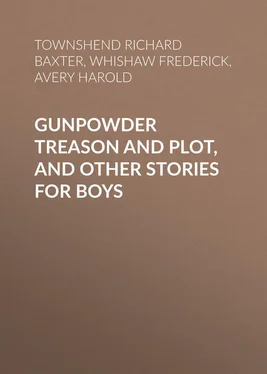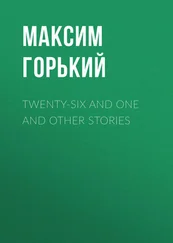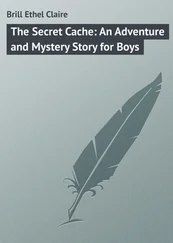Richard Townshend - Gunpowder Treason and Plot, and Other Stories for Boys
Здесь есть возможность читать онлайн «Richard Townshend - Gunpowder Treason and Plot, and Other Stories for Boys» — ознакомительный отрывок электронной книги совершенно бесплатно, а после прочтения отрывка купить полную версию. В некоторых случаях можно слушать аудио, скачать через торрент в формате fb2 и присутствует краткое содержание. Жанр: foreign_antique, foreign_prose, на английском языке. Описание произведения, (предисловие) а так же отзывы посетителей доступны на портале библиотеки ЛибКат.
- Название:Gunpowder Treason and Plot, and Other Stories for Boys
- Автор:
- Жанр:
- Год:неизвестен
- ISBN:нет данных
- Рейтинг книги:3 / 5. Голосов: 1
-
Избранное:Добавить в избранное
- Отзывы:
-
Ваша оценка:
- 60
- 1
- 2
- 3
- 4
- 5
Gunpowder Treason and Plot, and Other Stories for Boys: краткое содержание, описание и аннотация
Предлагаем к чтению аннотацию, описание, краткое содержание или предисловие (зависит от того, что написал сам автор книги «Gunpowder Treason and Plot, and Other Stories for Boys»). Если вы не нашли необходимую информацию о книге — напишите в комментариях, мы постараемся отыскать её.
Gunpowder Treason and Plot, and Other Stories for Boys — читать онлайн ознакомительный отрывок
Ниже представлен текст книги, разбитый по страницам. Система сохранения места последней прочитанной страницы, позволяет с удобством читать онлайн бесплатно книгу «Gunpowder Treason and Plot, and Other Stories for Boys», без необходимости каждый раз заново искать на чём Вы остановились. Поставьте закладку, и сможете в любой момент перейти на страницу, на которой закончили чтение.
Интервал:
Закладка:
"Run and ask Mr. Headon to be judge for this race, will you?" said Noel. "I hardly like officiating when it means so much for my brother."
The boy ran off to request the master named to undertake the duty which Noel, under the circumstances, dreaded; but he was too late. Mr. Headon was at the starting-place, and the race was begun before the messenger reached him.
It was a magnificent race.
Granby got off badly, his foot slipping at the mark and losing him nearly two yards.
Bradbury, seeing that he had an advantage at the start, made stupendous efforts to retain the lead, and did well for the first half of the race. But inch by inch Granby crept up behind him, and when but ten yards were left to run there was scarcely half a yard between them.
Bradbury made his effort, and for an instant it seemed as though those last eighteen inches would not be recovered by his opponent; but Granby made his own effort, and a frantic one, in the last three strides, ending with a leap forward which appeared to a few to land him in front of Bradbury. To the majority they seemed to breast the tape at the same instant; to a second minority it appeared that Bradbury had just won.
Beyond the tape Granby had shot well ahead. Had the race been five yards farther he would certainly have won it. As it was, all eyes were turned upon Noel, in whose hands the decision lay. Partisan shouts arose and rent the air. Some shouted "Brocklehurst!" – a majority, perhaps; others shrieked "Bradbury!"
Noel's face was very pale, but he had a set, determined look about the mouth. He was going to decide as he believed to be right and just – that was clear.
The head-master bustled up, panting, having "scorched" up from the starting-mark.
"Well, Brocklehurst?" he said; "well?"
"Bradbury, sir, by two inches," said poor Noel; and, having dashed the cup of happiness from Granby's and his own lips, he turned and marched away to his study and shut himself up, quite tragically miserable. Perhaps he even shed a tear of mortification. He was only thirteen, be it remembered, and the decision against his brother had been a very hard and somewhat heroic thing.
Granby arrived presently, and entered the study, taking no notice of Noel. He was evidently very angry, for he banged the books about, and scattered a packet of chocolate – Noel's – all over the floor.
Noel was nervous as to how Granby would take his decision. Perhaps he would not understand how more than ordinarily important it had been that he should be absolutely impartial, or even inclined, if anything, to favour the opponent.
"Granby, I'm awfully sorry, old man," he began, "that you didn't win. I'd give a good deal – "
"You're a liar! I did win! Everybody says so but you," said Granby, interrupting him furiously.
"Well, I watched both posts, and I did my best to give a fair decision," said Noel, shocked at his brother's violence.
"You have swindled me in Bradbury's favour," Granby began.
Noel laughed. He was growing angry also.
"What rot you talk!" he said; "as if I wouldn't rather you had won!"
"Then why not tell the truth and say I did, like a man?" cried angry, disappointed Granby.
Noel saw that argument was useless, and left the study; but afterwards, later in the evening, he returned to the charge.
"Come, Granby; we'd better shake hands and make it up," he began, but Granby interrupted him.
"Will you admit you cheated me?" he said.
"Certainly not!" said Noel. "I tell you I – "
"Very well; you have ruined my happiness. I was set upon getting that medal, and you have lost it to me by your unfairness. I shall never shake hands with you again so long as I possess a right hand, and it's no use your speaking to me in future, for I shan't answer!"
"Oh, very well," said Noel, hurt and offended, leaving the room; "I daresay you'll be less idiotic about all this when you've slept over it."
Noel certainly never supposed that Granby's wrath would last, or that he would carry out his avowed intention of "remaining enemies," and of silence. Had he known what he was to learn with deep regret during the next few years of their lives – namely, that Granby would remain obstinately determined to ignore his brother when in his presence – he would somehow have contrived to soften the bitterness of his offence on that first night, or have made almost any sacrifice in order to appease the floodtide of fury and mortification which his unfortunate decision – a wrong one, as many assured him – had called forth. But from this time forward not a word would Granby vouchsafe his brother, even though affectionately addressed or treated with marked kindness. During their sojourn on board the Britannia , officers, instructors, and cadets were alike amused first, and afterwards incensed, by the obstinate refusals of Granby to speak to his brother. The older men, officers and instructors, devised many ways of bringing them together, for both were noteworthy among the cadets of their year, whether at work or play; but no ingenuity of theirs was successful in compelling Granby to address even an accidental word to his brother, for his own cleverness was at least equal to theirs, and he invariably contrived to escape the necessity of direct communication with Noel by employing a third party to convey the required message or whatever he might have been asked to do or say.
As for the cadets, Granby soon showed these interfering persons that two things in connection with his quarrel with Noel must be laid to heart by them. The first was, that the said quarrel was no affair of theirs, and that interference or attempted peace-making, by trickery or otherwise, was dangerous . Granby was a doughty person among the cadets of his term, or any term, and not one to be lightly provoked.
The other truth they were obliged to learn was this, that though Granby might not wish, for private reasons, to maintain friendly intercourse with his brother, no one else in this world was at liberty to offend or injure Noel in his presence, whether Noel himself were by or not. Once or twice some misguided cadet attempted to curry favour with Granby by abusing Noel, imagining that he would thereby placate the brother who, to all appearances, was upon the worst possible terms with his twin. Such cadets learned very quickly that their last state was worse than the first.
As for Noel, the state of affairs with Granby gave him much sorrow as well as shame. He was as fond of his brother as ever, in spite of his foolish, long-continued obstinacy, and this although he was at times very angry with him, and ashamed of the foolishness which Granby was apparently not himself ashamed to display before others. Was Granby waiting for an apology for the old offence at Cubberly? Well, Noel was not without a spice of stubborn will, though his obstinacy was not to be compared with that of his brother, and he for his part was firmly determined that he would never offer any kind of apology for his decision on that historical occasion, unless Granby should first own up to his great foolishness, and ask for pardon.
Nevertheless, though Granby never replied, and though Noel knew that he would never reply, Noel invariably spoke to his brother just as though he might be expected to carry on the conversation; or, if others were present, he would refer to Granby by name just as frequently, during the course of conversation, as to any other person. And on such occasions Granby would reply as though one of the others had spoken, and not Noel.
It was a queer state of things, and sometimes ludicrously exasperating, as, for instance, one day when, during a cricket match on the beautiful Dartmouth Hill, the brothers being at the wickets together, Granby ran Noel out simply because he would not so much as cry "No!" when Noel called a run and started from his wicket. Granby had been somewhat ashamed of this, and had said in Noel's presence afterwards that he was "beastly sorry he had run some fellow out" – he forgot who it was – but "he ought to have seen there was no run."
Читать дальшеИнтервал:
Закладка:
Похожие книги на «Gunpowder Treason and Plot, and Other Stories for Boys»
Представляем Вашему вниманию похожие книги на «Gunpowder Treason and Plot, and Other Stories for Boys» списком для выбора. Мы отобрали схожую по названию и смыслу литературу в надежде предоставить читателям больше вариантов отыскать новые, интересные, ещё непрочитанные произведения.
Обсуждение, отзывы о книге «Gunpowder Treason and Plot, and Other Stories for Boys» и просто собственные мнения читателей. Оставьте ваши комментарии, напишите, что Вы думаете о произведении, его смысле или главных героях. Укажите что конкретно понравилось, а что нет, и почему Вы так считаете.












